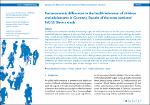Socioeconomic differences in the health behaviour of children and adolescents in Germany. Results of the cross-sectional KiGGS Wave 2 study
Kuntz, Benjamin
Waldhauer, Julia
Zeiher, Johannes
Finger, Jonas D.
Lampert, Thomas
Childhood and adolescence are key determining stages for health behaviour in the life course. Frequently, healthrelated
attitudes and patterns of behaviour that develop at young age are also maintained at adult age. As studies
show, already during childhood and adolescence, patterns of health risk behaviour are more common in certain
population groups. KiGGS Wave 2 results confirm that 3- to 17-year-old children and adolescents from families with
low socioeconomic status (SES) eat a less healthy diet, do fewer sports and are more often overweight or obese
than their peers from more affluent backgrounds. Whereas socioeconomic differences appear to have little effect
on levels of alcohol consumption among 11- to 17 year-olds, girls and boys with low SES smoke more frequently
than their peers with high SES. Prevention and health promotion encourage children and adolescents to adopt
healthy lifestyles, and aim to drive structural changes to stimulate behaviour which promotes good health. Combining
measures that target individual behaviour and a settings-based approach appears to be the most promising
preventative approach to reduce health inequalities among young people. Due to the clear impacts of socioeconomic
differences on health behaviour already at young age measures for disadvantaged children and adolescents and
their living conditions should be given an even stronger focus in the future.
Dateien zu dieser Publikation

